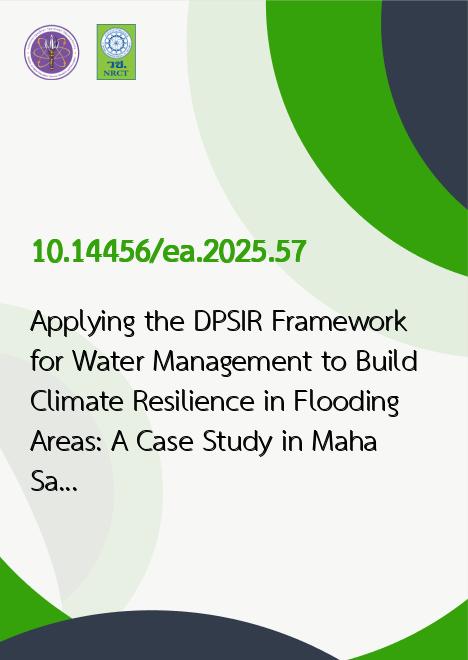
|
Applying the DPSIR Framework for Water Management to Build Climate Resilience in Flooding Areas: A Case Study in Maha Sarakham Province, Thailand |
|---|---|
| รหัสดีโอไอ | |
| Creator | Nittaya Pasukphun |
| Title | Applying the DPSIR Framework for Water Management to Build Climate Resilience in Flooding Areas: A Case Study in Maha Sarakham Province, Thailand |
| Contributor | Chompoo Nuasri, Angsuma Kanchak, Potsirin Limpinan, Yanasinee Suma, Nittaya Pasukphun |
| Publisher | Thai Society of Higher Education Institutes on Environment |
| Publication Year | 2568 |
| Journal Title | EnvironmentAsia |
| Journal Vol. | 18 |
| Journal No. | 3 |
| Page no. | 135-145 |
| Keyword | DPSIR framework, Water management, Climate resilience, Climate change, Flooding area |
| URL Website | http://www.tshe.org/ea/index.html |
| Website title | EnvironmentAsia |
| ISSN | 1906-1714 |
| Abstract | This study applied the Driver-Pressure-State-Impact-Response (DPSIR) Framework to analyze water management under climate change in Maha Sarakham Province, considering the socio-economic context of the province. By reviewing literature published between 2015 and 2019, the study identified key factors influencing water management under climate change. The results revealed that the province is highly vulnerable to climate variability, including rising temperatures and changing rainfall patterns over the years, which have resulted in more frequent and intense flooding and droughts. These climatic changes have significantly impacted agriculture, the primary source of income for the local population. The DPSIR model emphasized the crucial role of climate change indicators in developing policies and measures for water management. Additionally, the study highlighted the importance of integrating climate change knowledge, climate forecasting, and adaptation strategies in creating preparedness plans for water management. Community involvement in water management was also essential for establishing effective policies and action plans tailored to the province’s needs. |